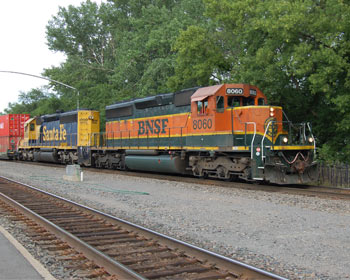Railroad Awareness Week Scheduled
Posted: Nov 8, 2006
 During the week of Nov. 6-10, the Upper Great Plains Transportation Institute and the Department of Civil Engineering will observe "Railroad Week" to raise the awareness of the importance of freight railroad transportation in the United States and draw attention to potential careers in the railroad industry.
During the week of Nov. 6-10, the Upper Great Plains Transportation Institute and the Department of Civil Engineering will observe "Railroad Week" to raise the awareness of the importance of freight railroad transportation in the United States and draw attention to potential careers in the railroad industry.
"With the continued steady growth of the railroad systems through increased global trade and movement of goods and freight from the central region to the ports, we are opening new doors for our civil engineering and transportation students by making them aware of the many benefits of this industry," notes Dinesh Katti, chair of the Department of Civil Engineering.
"The railroad industry is facing the requirement of hiring large numbers of employees in the near- and mid-term to augment the current work force. Associated with the recent and anticipated huge increase in traffic volume is the need to expand rail capacity - initiatives which rely heavily on the skills of engineering and management personnel. Awareness weeks such as this will hopefully educate students and make them aware of the great opportunities available in the railroad industry."
The week-long event also draws attention to efforts at NDSU to increase its focus on railroad engineering and management. In partnership with the Association of American Railroads and a number of Class I and regional railroads, NDSU is boosting railroad-focused scholarship and internship programs and adding railroad-related material to course content and research programs.
Craig Rockey, vice president of policy and economics with the Association of American Railroads, emphasized the value of such an event.
"One of the commonly misunderstood aspects of the freight railroad industry is its significance to the economy," he said. Rockey notes that railroads, which transport virtually everything grown, mined, manufactured, and consumed, account for 42 percent of all ton-miles of goods shipped in the United States. "The industry also throws off huge social benefits," he says, listing congestion mitigation, pollution reduction, transportation safety and fuel efficiency.
Rockey notes that all modes of freight transportation in the United States are facing capacity challenges. "Historically, railroads have been looked to as a safety valve for capacity concerns, particularly in a growing economy," he says. "Today, railroads are in a position unlike any time in their history. In certain places and on certain corridors, capacity is being reached. In the past there's been a general ability to routinely absorb demand increases onto the existing network."
The railroad industry reinvests 40 percent of its revenues into maintaining and expanding its assets and capabilities. "And, we're seeing significantly larger increments of that rising investment being directed toward expansion," Rockey notes.
That presents important opportunities for new graduates. "As railroads devote greater resources to expansion, they're also paying greater attention to engineering, operations and strategic planning. Those are key elements to our industry's ability to expand, maintain safe and efficient operations, and provide increasingly more responsive and reliable customer service."
"All railroads are actively involved in programs which will allow them to play an expanding role in our economy," Rockey says. In addition to adding to their track systems, they are acquiring new locomotives and freight cars, adding new technology, recruiting and training employees, adopting new operating plans, cooperating on joint efforts among railroads, and introducing innovations to their customers."
During the week, railroad professionals will address civil engineering classes and students in the Masters of Military Logistics program. Brian Lindamood of Alaska Railroad Corp. will present technical facts on railroad engineering and railroad transportation to support military logistics, as well as the uniqueness of the Alaska Railroad. "Railroads have inherent advantages to most other modes of transportation when measured in economic terms of volume and as those other means of transportation struggle with capacity and operational costs, railroads will continue to reap the growth benefits of being a viable alternative". Lindamood received an M.S. in civil engineering from NDSU.
Dan Zink, Red River Valley Western Railroad, will present on regional railroad operations in the northern plains and issues related to short-line and regional railroads.
Published in NDSU's staff newsletter
It's Happening at State
Nov. 8, 2006